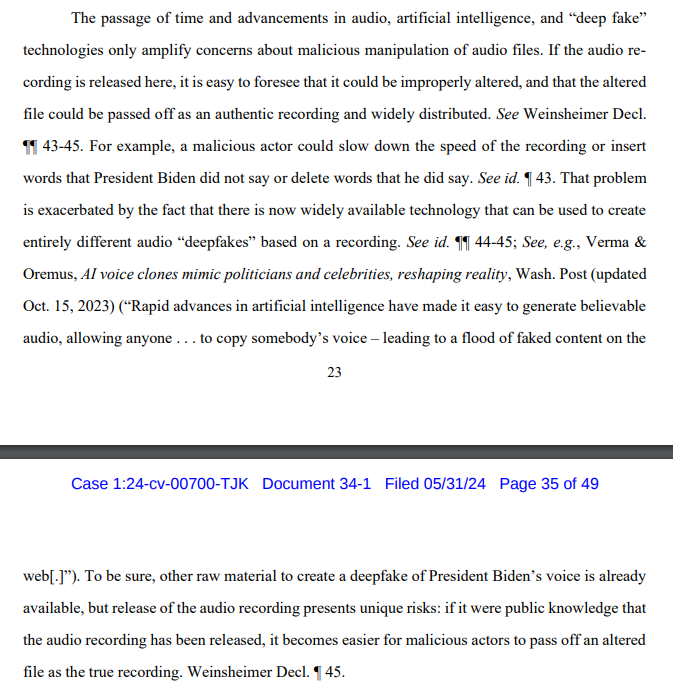The Department of Justice (DOJ) has raised objections to the release of audio tapes containing special counsel Robert Hur’s interview with Joe Biden, citing fears of potential manipulation through “deep fake” technology.
In a Friday filing obtained by Politico, the DOJ expressed concerns that the audio recordings could be altered using artificial intelligence, leading to the creation of fraudulent content. The DOJ highlighted the risks posed by advancements in audio manipulation technologies, stressing the possibility of malicious actors passing off altered recordings as authentic.
…The filing is logically and legally absurd. It is also dangerous. The argument would allow staff to completely control any public or, more importantly, congressional review of his actual speech and discourse.
— Jonathan Turley (@JonathanTurley) June 2, 2024
Trump's Sovereign Wealth Fund: What Could It Mean For Your Money?
Excerpt from filing where ‘deep fake’ is mentioned. Full filling at the bottom of this article.

The Heritage Foundation’s Oversight Project weighed in on the issue, interpreting the DOJ filing as an acknowledgment of the White House’s alleged manipulation of evidence to portray Joe Biden in a more favorable light. In a statement on social media platform X, they asserted that the filing had revealed significant revelations about the case.
🚨WHITE HOUSE ADMITS THEY DOCTORED BIDEN’S CRIMINAL TRANSCRIPT🚨
After being forced into Federal court by us, the White House admits they altered evidence to make Biden appear less incompetent
This case has been blown wide open https://t.co/lVHs5w4wPX pic.twitter.com/5xtIsPcVTV
— Oversight Project (@OversightPR) June 1, 2024
This Could Be the Most Important Video Gun Owners Watch All Year
MORE NEWS: Prince Andrew Gives Up Duke of York Title Amid Renewed Scrutiny Over Epstein Ties [WATCH]
Sources cited by The Hill indicate that the Biden regime’s apprehensions regarding artificial intelligence stem from widespread anxieties about the proliferation of deep fake content. Concerns from experts and observers have underscored the potential dangers of utilizing A.I. to manipulate audiovisual material.
DOJ officials underscored the privacy implications at stake, arguing that the public release of the audio would compromise substantial privacy interests. The DOJ’s adamant stance against the dissemination of the audio tapes underscores the ongoing debate surrounding the intersection of technology, authenticity, and privacy in today’s digital age.
The opinions expressed by contributors and/or content partners are their own and do not necessarily reflect the views of RVM News. Contact us for guidelines on submitting your own commentary.
Join the Discussion
COMMENTS POLICY: We have no tolerance for messages of violence, racism, vulgarity, obscenity or other such discourteous behavior. Thank you for contributing to a respectful and useful online dialogue.